‘A Doll’s House’ will leave you a changed person
 Director Anne Dodd and her amazing cast have something special going on at Theatre Conspiracy this weekend and next. It’s called A Doll’s House and, I promise, you will leave the Foulds Theatre a changed person after seeing it.
Director Anne Dodd and her amazing cast have something special going on at Theatre Conspiracy this weekend and next. It’s called A Doll’s House and, I promise, you will leave the Foulds Theatre a changed person after seeing it.
In case you’re not familiar with this Henrik Ibsen classic, the play takes place in an unidentified city somewhere in Norway – although, truthfully, the story could just as easily have taken place (as George  Bernard Shaw famously stated later) in “every suburb in Europe,” or present-day America for that matter. All of the action takes place in the spare living room of an upper middle-class couple, Torveld and Nora Helmer. He’s a newly-promoted bank manager. She’s his very pretty trophy wife – a curvy, arch-browed Bild Lilli doll trapped in a real-life doll’s house – or to be more apt, a Budgie in a gilded cage.
Bernard Shaw famously stated later) in “every suburb in Europe,” or present-day America for that matter. All of the action takes place in the spare living room of an upper middle-class couple, Torveld and Nora Helmer. He’s a newly-promoted bank manager. She’s his very pretty trophy wife – a curvy, arch-browed Bild Lilli doll trapped in a real-life doll’s house – or to be more apt, a Budgie in a gilded cage.
The point is that Torveld Helmer treats his wife as a pet rather than his equal, and to drive the message home, Ibsen repeatedly has Torveld endearingly refer to his wife as his sparrow  (when she’s a good little bird), a skylark (when she’s naughty) and a loon (when she gets all crazy). And to ensure that you get the allegory even before the lights dim, Anne Dodd and Theatre Conspiracy Artistic Director Bill Taylor have encased the Helmers’ Victorian parlor in an immense bird cage constructed of curved PVC pipe spray-painted
(when she’s a good little bird), a skylark (when she’s naughty) and a loon (when she gets all crazy). And to ensure that you get the allegory even before the lights dim, Anne Dodd and Theatre Conspiracy Artistic Director Bill Taylor have encased the Helmers’ Victorian parlor in an immense bird cage constructed of curved PVC pipe spray-painted 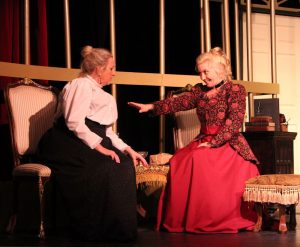 gold that really “sets the stage” for play’s overarching message. [Taylor has built quite a reputation for daring, innovative set designs, but he’s really outdone himself with this one!]
gold that really “sets the stage” for play’s overarching message. [Taylor has built quite a reputation for daring, innovative set designs, but he’s really outdone himself with this one!]
Brendan Powers is superb as Torveld Helmer. As the benevolent paternalist, he is blissfully ignorant of the condescendingly oppressive role he fulfills in male-dominated society. As long as Nora comports to 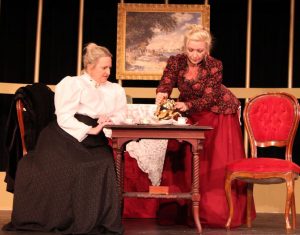 his preconceived notion of how a good wife should think, act, walk and talk, he can easily profess his love and undying devotion. But should she stray from this religiously-ingrained societal paradigm, well, all bets are off – as the audience experiences first-hand in the explosive penultimate scene toward the end of Act Three. Torveld is the product of his upbringing and socialization. So much so that it’s never occurred to him to examine or
his preconceived notion of how a good wife should think, act, walk and talk, he can easily profess his love and undying devotion. But should she stray from this religiously-ingrained societal paradigm, well, all bets are off – as the audience experiences first-hand in the explosive penultimate scene toward the end of Act Three. Torveld is the product of his upbringing and socialization. So much so that it’s never occurred to him to examine or 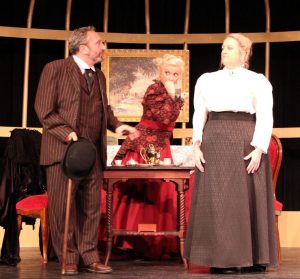 question any of the assumptions or presuppositions that govern his life. And so, he is caught totally flatfooted and off-guard when his wife asserts her value as a person, announcing unceremoniously that she won’t play the part of household pet any longer. It takes an actor with crazy mad skills to be so convincing in a role such as this. Brendan Powers is that guy.
question any of the assumptions or presuppositions that govern his life. And so, he is caught totally flatfooted and off-guard when his wife asserts her value as a person, announcing unceremoniously that she won’t play the part of household pet any longer. It takes an actor with crazy mad skills to be so convincing in a role such as this. Brendan Powers is that guy.
Dena Galyean plays the role of Nora Helmer. Over the past few years,  Galyean has tackled bigger, badder and more challenging roles. She’s gone from the conflicted, sexually harassed Vixen in The Eight: Reindeer Monologues (Lab Theater) three seasons ago to Stella Kowalski in Tennessee Williams’ A Streetcar Named Desire (The Studio Players), but this is unquestionably a breakout role for this rising star.
Galyean has tackled bigger, badder and more challenging roles. She’s gone from the conflicted, sexually harassed Vixen in The Eight: Reindeer Monologues (Lab Theater) three seasons ago to Stella Kowalski in Tennessee Williams’ A Streetcar Named Desire (The Studio Players), but this is unquestionably a breakout role for this rising star.
The role of Nora is tricky. Played incorrectly, she’ll come off as a devious, duplicitous, spoiled  woman who’s never grown up. She giggles incongruously, seems self-absorbed, and indulges extravagances such as chocolates and champagne at the expense of her overworked, underpaid husband. But that’s all a dodge. The real Nora Helmer is a resourceful, forward-thinking woman who is forced to play the part of a simpleminded piece of eye candy who’s compelled to laugh, sing, dance and dress for the pleasure and aggrandizement of
woman who’s never grown up. She giggles incongruously, seems self-absorbed, and indulges extravagances such as chocolates and champagne at the expense of her overworked, underpaid husband. But that’s all a dodge. The real Nora Helmer is a resourceful, forward-thinking woman who is forced to play the part of a simpleminded piece of eye candy who’s compelled to laugh, sing, dance and dress for the pleasure and aggrandizement of  her doting but overbearing husband just like a dog trained to roll over or sit up for her master. Nora has been groomed for the part her entire life – first, by her father, and later by societal expectations and norms. But she’s done something extraordinary and chaffs for recognition of the powerful, self-confident woman lurking beneath the veneer of her carefully-cultured doll-like
her doting but overbearing husband just like a dog trained to roll over or sit up for her master. Nora has been groomed for the part her entire life – first, by her father, and later by societal expectations and norms. But she’s done something extraordinary and chaffs for recognition of the powerful, self-confident woman lurking beneath the veneer of her carefully-cultured doll-like  persona.
persona.
And what did she do? The audience quickly discovers that Nora borrowed $10,000 from a disgraced lawyer to save her husband’s life. His doctor had ordered him to go to a warmer climate lest he succumb to some unspecified illness. But to get the money needed to finance the trip, she had to forge her father’s name on the promissory note. You see, at that time (which is 1879, the same year Thomas Edison  patented the incandescent light bulb!) a woman was not able to borrow money, enter into a contract or purchase real estate on her own signature.
patented the incandescent light bulb!) a woman was not able to borrow money, enter into a contract or purchase real estate on her own signature.
Through a combination of wile and frugality, she has managed to scrape together enough money to pay the interest as it accrues, but now in the employ of her husband’s bank, the lender threatens to reveal both the loan and the forgery to Torveld unless Nora convinces her husband to not only retain him in the bank’s employ, but give him a promotion as well.  Faced with impending exposure, Nora vacillates between despair and euphoria. The latter state is induced by the hope and belief that once Torveld understands the risks she was willing to take in order to save his life, he will not only come to her defense, he’ll finally see her as the savvy, enterprising woman she really is. [Hint: This is no For Pete’s Sake (a 1974 farce in which a wife
Faced with impending exposure, Nora vacillates between despair and euphoria. The latter state is induced by the hope and belief that once Torveld understands the risks she was willing to take in order to save his life, he will not only come to her defense, he’ll finally see her as the savvy, enterprising woman she really is. [Hint: This is no For Pete’s Sake (a 1974 farce in which a wife  (played by Barbra Streisand) borrows $3,000 from a Mafia loan shark without her husband’s knowledge in order to give him a chance for the college education he gave up when he married her).]
(played by Barbra Streisand) borrows $3,000 from a Mafia loan shark without her husband’s knowledge in order to give him a chance for the college education he gave up when he married her).]
There is so much about Galyean’s performance in this play that’s just plain riveting, but her ability to flip the switch from euphoric (read, manic) to depressive, from 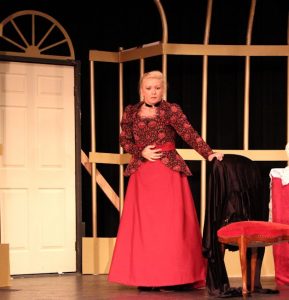 authentic to façade is totally mesmerizing. But what’s even more impressive than that is her uncanny ability to play a character whose whole life is an act. (And if you are familiar with Dena’s body of work, you’ll be glad to know that she has ample opportunity in this play to unleash an expanded and refined repertoire of sidelong glances and her trademark dagger eyes.)
authentic to façade is totally mesmerizing. But what’s even more impressive than that is her uncanny ability to play a character whose whole life is an act. (And if you are familiar with Dena’s body of work, you’ll be glad to know that she has ample opportunity in this play to unleash an expanded and refined repertoire of sidelong glances and her trademark dagger eyes.)
A Doll’s House has been touted as a feminist play. While Ibsen’s story and characterizations have undeniable women’s rights overtones, at its core A Doll’s House is about speaking your truth and seeing other people for who and what they truly are, rather than what you think they are or should be. And this is what Ibsen and Dodd want to say most of all by and through A Doll’s House. Torveld sees and loves Nora not for the person she actually is, but rather as a two-dimensional caricature of the ideal wife, mother, child and pet he wants her to be. Nora has always been willing to play along, to be the woman
is about speaking your truth and seeing other people for who and what they truly are, rather than what you think they are or should be. And this is what Ibsen and Dodd want to say most of all by and through A Doll’s House. Torveld sees and loves Nora not for the person she actually is, but rather as a two-dimensional caricature of the ideal wife, mother, child and pet he wants her to be. Nora has always been willing to play along, to be the woman 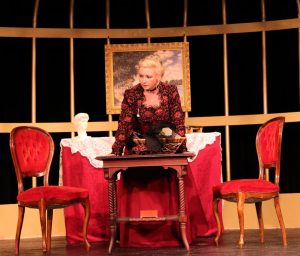 her husband expects and wants her to be. But when Torveld fails to live up to her own fantasy of how a husband should respond to someone who is threatening her, Nora suddenly realizes that not only is Torveld not the man she thought he was, he’s a person she doesn’t love, cannot respect and does not want to be around.
her husband expects and wants her to be. But when Torveld fails to live up to her own fantasy of how a husband should respond to someone who is threatening her, Nora suddenly realizes that not only is Torveld not the man she thought he was, he’s a person she doesn’t love, cannot respect and does not want to be around.
Nora states that neither Torveld nor her father loved her for herself. Instead, they loved the idea of loving her.  How many of us are guilty of this same kind of miasma? We all have ideas and ideals of how spouses, children, bosses, employees, athletes, entertainer and politicians are supposed to think and act. When they don’t, we’re disappointed, discouraged and sometimes even dispirited. But the fault is not theirs. It is ours – for failing to look for and see the real person behind and beneath the role
How many of us are guilty of this same kind of miasma? We all have ideas and ideals of how spouses, children, bosses, employees, athletes, entertainer and politicians are supposed to think and act. When they don’t, we’re disappointed, discouraged and sometimes even dispirited. But the fault is not theirs. It is ours – for failing to look for and see the real person behind and beneath the role  or persona. It’s no different than judging a person based on the color of their skin, their sex or their place of ethnic origin.
or persona. It’s no different than judging a person based on the color of their skin, their sex or their place of ethnic origin.
From that vantage, A Doll’s House is a play that everyone – bar no one – should see (and perhaps even see multiple times.)
 But there exist so many other reasons to see this particular production. As stated, the set is unbelievable. Anne Dodd has done a superlative job in updating and streamlining Henrik Ibsen’s 139-year-old albeit timeless script. And in addition to Powers and Galyean, Patrick Day, Karen Goldberg and James Robinson turn in sensational performances in supporting roles. Day is especially good in giving depth and dimension to the dastardly character of disgraced lawyer Nils Krogstad. Hell,
But there exist so many other reasons to see this particular production. As stated, the set is unbelievable. Anne Dodd has done a superlative job in updating and streamlining Henrik Ibsen’s 139-year-old albeit timeless script. And in addition to Powers and Galyean, Patrick Day, Karen Goldberg and James Robinson turn in sensational performances in supporting roles. Day is especially good in giving depth and dimension to the dastardly character of disgraced lawyer Nils Krogstad. Hell,  he even grew a beard just for the part. And even though her role is extremely confined and limited, Eren Sisk does a lot with the part of the maid, Helene. She’s apparently learned a thing to two from Dena Galyean about how to make a powerful statement with no more than the flash of her eyes.
he even grew a beard just for the part. And even though her role is extremely confined and limited, Eren Sisk does a lot with the part of the maid, Helene. She’s apparently learned a thing to two from Dena Galyean about how to make a powerful statement with no more than the flash of her eyes.
So, channel your own inner Nora and be decisive. Make plans now to see Theatre Conspiracy’s production of A Doll’s House. But don’t go with  preconceived notions about what the play has to say or is all about. See it for what it is, and decide what to glean for yourself. Do that, and you’ll leave the Foulds Theatre a changed person. That I can promise you.
preconceived notions about what the play has to say or is all about. See it for what it is, and decide what to glean for yourself. Do that, and you’ll leave the Foulds Theatre a changed person. That I can promise you.
March 1, 2018.
RELATED POSTS.
- Ibsen’s ‘Doll House’ more relevant than ever
- Brendan Powers plays Torvald Helmer in Henrik Ibsen’s ‘A Doll’s House’
 Dena Galyean plays Nora Helmer in Henrick Ibsen’s ‘A Doll’s House’
Dena Galyean plays Nora Helmer in Henrick Ibsen’s ‘A Doll’s House’- Patrick Day plays Nils Krogstad in Theatre Conspiracy’s production of ‘A Doll’s House’
- Karen Goldberg plays Kristine Linde in ‘A Doll’s House’
- Eren Sisk is Helene in Theatre Conspiracy’s production of ‘A Doll’s House’
- The muse who inspired Ibsen to write ‘A Doll’s House’
- ‘A Doll’s House’ play dates, times and ticket info














 Tom Hall is both an amateur artist and aspiring novelist who writes art quest thrillers. He is in the final stages of completing his debut novel titled "Art Detective," a story that fictionalizes the discovery of the fabled billion-dollar Impressionist collection of Parisian art dealer Josse Bernheim-Jeune, thought by many to have perished during World War II when the collection's hiding place, Castle de Rastignac in southern France, was destroyed by the Wehrmacht in reprisal for attacks made by members of the Resistance operating in the area. A former tax attorney, Tom holds a bachelor's degree as well as both a juris doctorate and masters of laws in taxation from the University of Florida. Tom lives in Estero, Florida with his fiancee, Connie, and their four cats.
Tom Hall is both an amateur artist and aspiring novelist who writes art quest thrillers. He is in the final stages of completing his debut novel titled "Art Detective," a story that fictionalizes the discovery of the fabled billion-dollar Impressionist collection of Parisian art dealer Josse Bernheim-Jeune, thought by many to have perished during World War II when the collection's hiding place, Castle de Rastignac in southern France, was destroyed by the Wehrmacht in reprisal for attacks made by members of the Resistance operating in the area. A former tax attorney, Tom holds a bachelor's degree as well as both a juris doctorate and masters of laws in taxation from the University of Florida. Tom lives in Estero, Florida with his fiancee, Connie, and their four cats.